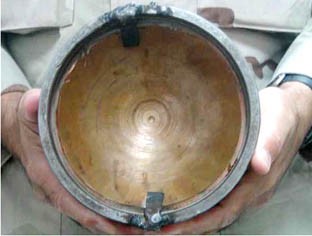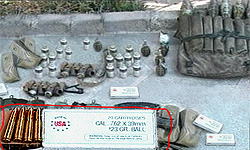By Richard Norman


American display of Iranian-made EFP (above) and Iranian display of American made weaponry (below).
Last week the Pentagon presented Iranian-made weapons they claimed had been used to kill American servicemen in Iraq. President Bush accused Iran of fomenting trouble in Iraq through the use of a paramilitary group with ties to high-level government officials.
The deadly and highly sophisticated weapons the military said it traced to Iran are known as "explosively formed penetrators," or EFPs.
The presentation was the result of weeks of preparation and revisions as U.S. officials put together a package of material to support the Bush administration’s claims of Iranian intercession on behalf of militant Iraqis fighting American forces….
[The presentation] included a power-point slide program and a handful of mortar shells and rocket-propelled grenades which the military officials said were made in Iran.
The centerpiece of the display, however, was a gray metal pipe about 10 inches long and 6 inches in diameter, the exterior casing of what the military said was an EFP, the roadside bomb that shoots out fist-sized wads of nearly molten copper that can penetrate the armor on an Abrams tank.
"A normal roadside bomb is like a shortgun blast. But these are like a rifle. They’re focused and they’re aimed. … It’s going to take anything out in its way, go in one side and out the other," said 1st Lt. Zane Galvach, 25, of Dayton, Ohio, a soldier with the Army’s 2nd Division, based in Baghdad. [AP]
Not to be outdone, yesterday Iranian officials made their own presentation, sending the Fars News Agency a photograph of American made weaponry that they claimed had been used in attacks last week in southeastern Iran by a Sunni organization known as Jondallah.
Director General for the political affairs of Sistan and Balouchestan governorate Soltan-Ali Mir told FNA that the US and Britain are behind the recent terrorist attacks in the city of Zahedan, adding, "Washington and London are facing serious challenges as their interests in the Middle-East region have been endangered. Since the Islamic Republic is the main center of anti-US struggles, they are seeking to trouble Iran through a series of challenges, including terrorist attacks and unrests."Asked to elaborate on the documents proving involvement of the US and Britain in recent incidents in Iran’s Sistan and Balouchestan province, he said, "The weapons that the terrorists have used are US and British made. Moreover, the arrested terrorist agents have confessed that they have been trained by English-speaking people."
The official invited representatives of the United Nations, Human Rights watch and other international bodies to dispatch envoys to Iran to observe the available documents and proofs substantiating involvement of the Untied States and Britain in the recent terrorist attacks, including the blast and shootout on Wednesday.
"The US and Britain, which allege to be pioneers in the campaign against terrorism, are themselves actually defending the terrorists, training them and providing them with the needed media and financial supports and facilities," he added.
Soltan-Ali Mir further pointed out that the US and Britain intend to create a series of incidents in his province similar to what they have already done in Iraq.
"They intend to kill the Shiites and leave the footsteps at the door of the Sunnis or vice versa. Some of the arrestees confessed that they had plans to assassinate religious and tribal leaders of the Sunnis and put the blame on the Shiites in a bid to foment ethnic and religious conflicts," he stated. [Fars]

The origins of most military weapons aren’t too difficult to trace, due to inventory control numbers. The fact they’ve generally changed hands several times since the original sale is the more complicating factor.
Even if you disbelieve the US, I see no particular reason to take Iran at its word.
Given the flourishing black and grey markets for virtually all kinds of weaponry, is one at all surprised at how notoriously difficult it is to make definitive claims in this regard? And are we all not now a bit more dispositionally suspicious of ANY evidential claims made by the US in the international community, given its recent and appalling record. The US has lost all trust and credibility, and I suspect it will be some time–if ever–before it wins it back.
Is it ever otherwise? Do you believe that Iran has as much credibility as the US and the UK?